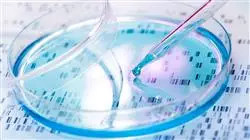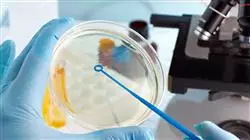University certificate
The world's largest faculty of medicine”
Introduction to the Program
The latest techniques and work systems in Genetics, Pathologies and Biobanks Network in the clinical analysis laboratory, with the most efficient teaching system on the market"

The research and techniques developed in genetics are very useful for the study of the cause, transmission and pathogenesis of numerous diseases. The objective of genetic medicine is to understand the different types of genetic alterations that give rise to diseases, analyze their transmission, identify carriers, and develop methods of prevention and treatment. In the laboratory, this study takes place in a practical way in the most important and specific developments in this area of work.
This module provides an in-depth analysis of the bases and mechanisms of the transmission of genetic material, with special attention to the particularities and characteristics of human genetics: the different genetic alterations that can give rise to diseases, the techniques and methods for diagnosing them, as well as the latest advances and research carried out in this field. All of this in the field of clinical analysis laboratories.
A compendium and deepening of knowledge that will lead you to excellence in your profession.
With this Course you will be able to combine high intensity training with your personal and professional life, achieving your goals in a simple and real way”
This Postgraduate certificate in Genetics, Pathologies and Biobanks Network offers you the characteristics of a high-level scientific, teaching, and technological course. These are some of its most notable features:
- Latest technology in online teaching software
- Highly visual teaching system, supported by graphic and schematic contents that are easy to assimilate and understand
- Practical cases presented by practising experts
- State-of-the-art interactive video systems
- Teaching supported by telepractice
- Continuous updating and recycling systems
- Self-regulating learning: full compatibility with other occupations
- Practical exercises for self-evaluation and learning verification
- Support groups and educational synergies: questions to the expert, debate and knowledge forums
- Communication with the teacher and individual reflection work
- Content that is accessible from any fixed or portable device with an Internet connection
- Supplementary documentation databases are permanently available, even after the course
A highly skilled course which will allow you to become a highly competent professional in genetics in a clinical analysis laboratory”
The teachers of this course are professionals currently working in a modern and accredited Clinical Laboratory, with a very solid training base and up to date knowledge in both scientific and purely technical disciplines.
In this way, we ensure that we provide you with the training update we are aiming for. A multidisciplinary team of professionals trained and experienced in different environments, who will cover the theoretical knowledge in an efficient way, but, above all, will put the practical knowledge derived from their own experience at the service of the course: one of the differential qualities of this course.
This mastery of the subject is complemented by the effectiveness of the methodological design of this course in Genetics, Pathologies and Biobanks Network. Developed by a multidisciplinary team of experts, it integrates the latest advances in educational technology. In this way, you will be able to study with a range of easy-to-use and versatile multimedia tools that will give you the necessary skills you need for your specialization.
The design of this program is based on Problem-Based Learning: an approach that conceives learning as a highly practical process. To achieve this remotely, we will use telepractice: with the help of an innovative interactive video system, and learning from an expert, you will be able to acquire the knowledge as if you were actually dealing with the scenario you are learning about. A concept that will allow you to integrate and fix learning in a more realistic and permanent way.
A program created and directed by active professionals who are experts in this field of work, which makes this course a unique opportunity for professional growth"

The learning in this Postgraduate certificate is developed through the most performed didactic methods in online teaching to guarantee that your efforts produce the best results possible"
Why study at TECH?
TECH is the world’s largest online university. With an impressive catalog of more than 14,000 university programs available in 11 languages, it is positioned as a leader in employability, with a 99% job placement rate. In addition, it relies on an enormous faculty of more than 6,000 professors of the highest international renown.

Study at the world's largest online university and guarantee your professional success. The future starts at TECH”
The world’s best online university according to FORBES
The prestigious Forbes magazine, specialized in business and finance, has highlighted TECH as “the world's best online university” This is what they have recently stated in an article in their digital edition in which they echo the success story of this institution, “thanks to the academic offer it provides, the selection of its teaching staff, and an innovative learning method aimed at educating the professionals of the future”
A revolutionary study method, a cutting-edge faculty and a practical focus: the key to TECH's success.
The most complete study plans on the university scene
TECH offers the most complete study plans on the university scene, with syllabuses that cover fundamental concepts and, at the same time, the main scientific advances in their specific scientific areas. In addition, these programs are continuously being updated to guarantee students the academic vanguard and the most in-demand professional skills. In this way, the university's qualifications provide its graduates with a significant advantage to propel their careers to success.
TECH offers the most comprehensive and intensive study plans on the current university scene.
A world-class teaching staff
TECH's teaching staff is made up of more than 6,000 professors with the highest international recognition. Professors, researchers and top executives of multinational companies, including Isaiah Covington, performance coach of the Boston Celtics; Magda Romanska, principal investigator at Harvard MetaLAB; Ignacio Wistumba, chairman of the department of translational molecular pathology at MD Anderson Cancer Center; and D.W. Pine, creative director of TIME magazine, among others.
Internationally renowned experts, specialized in different branches of Health, Technology, Communication and Business, form part of the TECH faculty.
A unique learning method
TECH is the first university to use Relearning in all its programs. It is the best online learning methodology, accredited with international teaching quality certifications, provided by prestigious educational agencies. In addition, this disruptive educational model is complemented with the “Case Method”, thereby setting up a unique online teaching strategy. Innovative teaching resources are also implemented, including detailed videos, infographics and interactive summaries.
TECH combines Relearning and the Case Method in all its university programs to guarantee excellent theoretical and practical learning, studying whenever and wherever you want.
The world's largest online university
TECH is the world’s largest online university. We are the largest educational institution, with the best and widest online educational catalog, one hundred percent online and covering the vast majority of areas of knowledge. We offer a large selection of our own degrees and accredited online undergraduate and postgraduate degrees. In total, more than 14,000 university degrees, in eleven different languages, make us the largest educational largest in the world.
TECH has the world's most extensive catalog of academic and official programs, available in more than 11 languages.
Google Premier Partner
The American technology giant has awarded TECH the Google Google Premier Partner badge. This award, which is only available to 3% of the world's companies, highlights the efficient, flexible and tailored experience that this university provides to students. The recognition as a Google Premier Partner not only accredits the maximum rigor, performance and investment in TECH's digital infrastructures, but also places this university as one of the world's leading technology companies.
Google has positioned TECH in the top 3% of the world's most important technology companies by awarding it its Google Premier Partner badge.
The official online university of the NBA
TECH is the official online university of the NBA. Thanks to our agreement with the biggest league in basketball, we offer our students exclusive university programs, as well as a wide variety of educational resources focused on the business of the league and other areas of the sports industry. Each program is made up of a uniquely designed syllabus and features exceptional guest hosts: professionals with a distinguished sports background who will offer their expertise on the most relevant topics.
TECH has been selected by the NBA, the world's top basketball league, as its official online university.
The top-rated university by its students
Students have positioned TECH as the world's top-rated university on the main review websites, with a highest rating of 4.9 out of 5, obtained from more than 1,000 reviews. These results consolidate TECH as the benchmark university institution at an international level, reflecting the excellence and positive impact of its educational model.” reflecting the excellence and positive impact of its educational model.”
TECH is the world’s top-rated university by its students.
Leaders in employability
TECH has managed to become the leading university in employability. 99% of its students obtain jobs in the academic field they have studied, within one year of completing any of the university's programs. A similar number achieve immediate career enhancement. All this thanks to a study methodology that bases its effectiveness on the acquisition of practical skills, which are absolutely necessary for professional development.
99% of TECH graduates find a job within a year of completing their studies.
Postgraduate Certificate in Genetics, Pathologies and Biobanks Network
Modern medicine is advancing faster every day and, with it, the importance of scientific research in the field of genetics and pathologies. In this context, it is crucial to have highly trained professionals in the management of cutting-edge technologies and methodologies in order to face the new challenges in medical care. Aware of this need, at TECH Global University we have created our Postgraduate Certificate in Genetics, Pathologies and Biobanks Network. The program, taught in 100% online mode, is designed to provide students with a solid and updated preparation in the fundamental concepts of genetics, pathologies and biobank management. The curriculum will deepen in the handling of biobanks, their management and their use in research, allowing students to understand the importance of these resources for the generation of knowledge and the advancement of modern medicine.
Specialization in Genetics, Pathology and Biobanks
At TECH we are committed to providing our students with a complete and quality training so that they can stand out in a highly competitive job market. Therefore, in this complete program we provide the necessary tools for professionals to become specialists. Our Postgraduate Diploma has a team of highly qualified professors and Postgraduate Diplomas in the field of genetics, pathologies and biobanks. Likewise, students will have access to state-of-the-art technological tools that will allow them to develop their skills to understand the molecular and cellular basis of diseases and their mechanisms of action, as well as current diagnostic and therapeutic methods. As they progress through the curriculum, biobank management, its management and its use in research will be addressed. This will contribute to the students' understanding of the importance of these resources for the generation of knowledge and the advancement of modern medicine.







